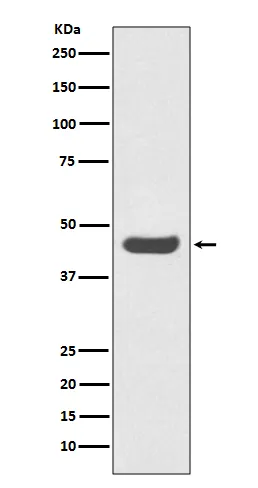
Size:100μL Price:$230
Size:200μL Price:$380
Application:WB,IHC,ICC/IF,FC,IP
Reactivity:Human
Conjugate:Unconjugated
Optional conjugates: Biotin, FITC (free of charge). See other 26 conjugates.
Gene Name:CD274
Summary
| Production Name | PD-L1 (CD274) (5R18) Rabbit Monoclonal Antibody |
| Description | Recombinant rabbit monoclonal antibody |
| Host | Rabbit |
| Application | WB,IHC,ICC/IF,FC,IP |
| Reactivity | Human |
Performance
| Conjugation | Unconjugated |
| Modification | Unmodified |
| Isotype | IgG |
| Clonality | Monoclonal |
| Form | Liquid |
| Storage | Store at 4°C short term. Aliquot and store at -20°C long term. Avoid freeze/thaw cycles. |
| Buffer | Rabbit IgG in phosphate buffered saline , pH 7.4, 150mM NaCl, 0.02% New type preservative N and 50% glycerol. Store at +4°C short term. Store at -20°C long term. Avoid freeze / thaw cycle. |
| Purification | Affinity purification |
Immunogen
| Gene Name | CD274 |
| Alternative Names | B7-H; B7H1; PD-L1; PDCD1L1; PDCD1LG1; PDL1; CD274; |
| Gene ID | 29126 |
| SwissProt ID | Q9NZQ7 |
Application
| Dilution Ratio | WB 1:500-1:2000,IHC 1:200-1:500,ICC/IF 1:100-1:200,FC 1:50-1:200,IP 1:20-1:50 |
| Molecular Weight | 33kDa |
Background
Programmed cell death ligand 1(CD274, or B7-H1, PD-L1), is the first member of B7 family to be discovered. B7 family molecules are type I transmembrane proteins belonging to the immunoglobulin superfamily. In concert with their CD28 family receptors, the B7s are key regulators of the adaptive immune response. CD274 is suggested a negative regulator of T and B cell, and play important role in mediating tolerance of lymphocytes to self-antigens. Plays a critical role in induction and maintenance of immune tolerance to self (PubMed:11015443, PubMed:28813417, PubMed:28813410). As a ligand for the inhibitory receptor PDCD1/PD-1, modulates the activation threshold of T-cells and limits T-cell effector response (PubMed:11015443, PubMed:28813417, PubMed:28813410). Through a yet unknown activating receptor, may costimulate T-cell subsets that predominantly produce interleukin-10 (IL10) (PubMed:10581077).
Research Area
Cell adhesion molecules (CAMs);
